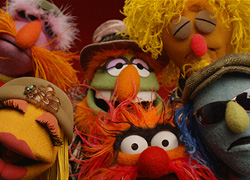Hays
Well-Known Member
- Joined
- Jul 12, 2002
- Messages
- 316
- Reaction score
- 4
I was just watching the episode about Rositas' grandma, and I just realized that Sesame Street isn't as diverse as it used to be.
Things are pretty much the same on the Street as when I was a little girl; they haven't removed any characters - but this is what I mean: between the 70s and now, the US has become more diverse, and the characters on Sesame Street are much the same.
When I was a little girl, I was one of two or three hispanics living in my town in the midwest - it helped a lot to see someone, Maria, who looked like my mother on Sesame Street every day, as part of a normal family (not latin stereotypes) These days, hispanics are rapidly becoming the country's largest minority. Nowadays, most children's shows incorporate Spanish and latin characters, and most kids know somebody who speaks Spanish - everybody who's eaten at Taco Bell knows what a fajhita is.
What we're losing is the understanding of smaller cultures or groups in the US that latins used to be part of; Arabs, Eastern Europeans, Italians, Asians (I'd like to see a gay family, but I think the time has not yet come) It doesn't matter specifically which one, just that whoever it is represents a true minority. Kids need to learn about differences even when they're not right out there every day.
SS does a good job with Global Grover, but this segment doesn't do what a set of characters will: show us the ways we are the same. Right now, we seem to be focusing on differences.
Considering today's climate, I'd like to see an Arab family on SS - it could either be Muppet characters or people. What do you think?
Things are pretty much the same on the Street as when I was a little girl; they haven't removed any characters - but this is what I mean: between the 70s and now, the US has become more diverse, and the characters on Sesame Street are much the same.
When I was a little girl, I was one of two or three hispanics living in my town in the midwest - it helped a lot to see someone, Maria, who looked like my mother on Sesame Street every day, as part of a normal family (not latin stereotypes) These days, hispanics are rapidly becoming the country's largest minority. Nowadays, most children's shows incorporate Spanish and latin characters, and most kids know somebody who speaks Spanish - everybody who's eaten at Taco Bell knows what a fajhita is.
What we're losing is the understanding of smaller cultures or groups in the US that latins used to be part of; Arabs, Eastern Europeans, Italians, Asians (I'd like to see a gay family, but I think the time has not yet come) It doesn't matter specifically which one, just that whoever it is represents a true minority. Kids need to learn about differences even when they're not right out there every day.
SS does a good job with Global Grover, but this segment doesn't do what a set of characters will: show us the ways we are the same. Right now, we seem to be focusing on differences.
Considering today's climate, I'd like to see an Arab family on SS - it could either be Muppet characters or people. What do you think?

 Welcome to the Muppet Central Forum!
Welcome to the Muppet Central Forum! Back to the Rock Season 2
Back to the Rock Season 2 Sesame Street Season 54
Sesame Street Season 54 The Muppets Mayhem premieres
The Muppets Mayhem premieres Bear arrives on Disney+
Bear arrives on Disney+ Sam and Friends Book
Sam and Friends Book